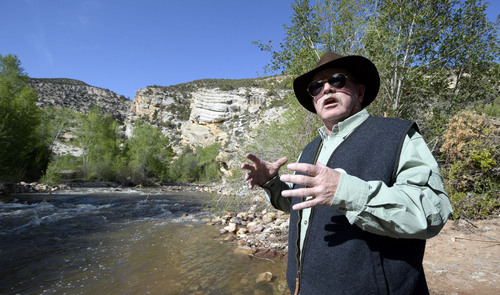This is an archived article that was published on sltrib.com in 2014, and information in the article may be outdated. It is provided only for personal research purposes and may not be reprinted.
"Whiskey is for drinking. Water is for fighting over." — Mark Twain
There probably is not a lot of whiskey in Utah's Uintah County. But there's not a whole lot of water, either.
Which is why the good news from that neck of the woods is that local folks are not fighting, but coming together to protect their public water supply from what is, so far, only a possible threat.
It sometimes seems that state and local officials are willing to befoul wildlife habitat, wild rivers, historic and prehistoric relics, even the very air, in some of Utah's more rural areas in order to gain a temporary cash flow by digging up oil and gas, sand and shale.
But there have been none of those drill-baby-drill Pavlovian responses from elected officials and active citizens in Vernal and Uintah County in the face of the possibility of a phosphate strip mine that would denude land near Taylor Mountain.
The Uintah County Commission has acted to protect the major source of its public water supply, the deep underground aquifer that feeds the idyllic Ashley Springs, establishing a buffer zone around the aquifer. Wayne Stevens, a former Bureau of Land Management staffer, is basing his campaign for the Utah Senate on his opposition to any such mine.
The landowner in question, the Utah School and Institutional Trust Lands Administration, is charged by law with making money, more money and nothing but money, for the state school fund. But even from SITLA we hear assurances that the project will not go forward unless it passes environmental review.
Such an environmental review should hold any such development to the highest standard possible. A standard that, quite frankly, might be impossible to meet for the most likely project — a strip mine for the fertilizer component, accompanied either by a slurry pipeline or a fleet of trucks.
If so, the whole idea should be thrown out of the window. No matter how much money there is to be made.
There is much argument in this state over whether the economic benefits to be gained by oil or gas wells, tar sands or oil shale are worth the resulting degradation of wild lands, which have always been there, or artifacts, which not enough people value.
There seems little argument in Uintah County, though, that the public water supply is not for sale at any price.



